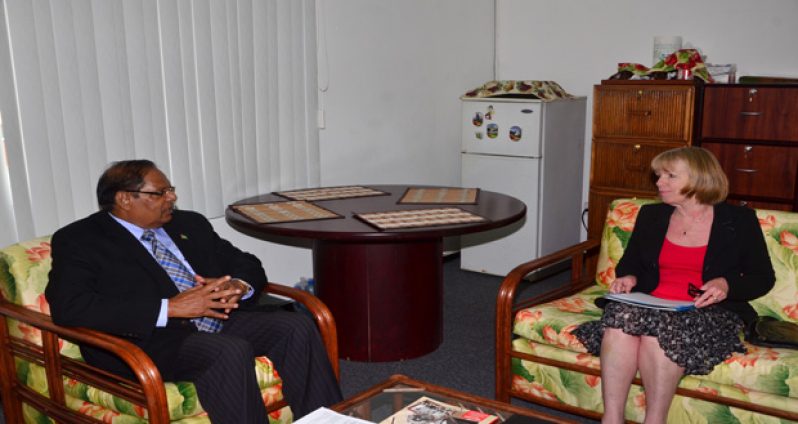MS. MARIANNE Flach, United Nations Children’s Fund (UNICEF) Representative to Guyana and Suriname, paid a courtesy call on Prime Minister Moses Nagamootoo, at the Office of the Prime Minister, located within the Ministry of the Presidency, as she sought support on a number of major issues.Prime Minister Moses Nagamootoo asserted that all issues brought before him during the discussion would have the support of his office. He noted that it is important that priority be placed on the care of our children, and said he accordingly has no reason not to support the call from UNICEF.
He also said he had made some suggestions that can further assist the Government in crafting and implementing these strategies.
Ms. Marianne Flach deemed her discussion with the Prime Minister very positive and fruitful, and said she looks forward to working with the Government.
“Since we have met quite a few of the line ministers, we thought it would be good to update the Prime Minister, asking for support on a number of cross-cutting issues,” she stated.
Flach highlighted, “We discussed the Constitutional Reform that the Government has been talking about. We would like to offer our support to this process and to look at the reform and to make sure that children are adequately catered for in this reform.”
The Prime Minister, she noted, gave a very positive reaction to the proposal, and she said “the PM requested that UNICEF should looked at constitutional reforms in other Third World countries and with that we can provide some root examples that the Government can draw from.
“We also talked about the youth policy which is currently being finalised and will be presented in Cabinet very soon, and then to Parliament. We also ask the PM for support on this process.”
She explained that another topic that is of grave concern to UNICEF is launching of the family court; and said “we hope that this will take place very soon.”
Further, she noted that the two parties discussed the alternative care policy, and “right now there is a draft policy with the Ministry of Social Protection,” she disclosed. Explaining what the policy entails, Flach said it concerns children from the age of zero to 3 years old. “It is about the environment in which these young children grow up in; it is very important that children of this age remain in the family-type environment, and not end up in institutions like orphanages. At this age, children need to develop one-to-one relationships.”
Flach noted: “We also discussed the support UNICEF is giving for Early Urban Childhood Development.” This, she explained, is for early childhood development that normally spans the age group from 0 to 8 years old. “We have a programme in place in the interior locations of Guyana, where we have worked with community health workers to integrate the early urban childhood development into their everyday care.” And this, she stressed; UNICEF would like to see extended to other communities.
By Rebecca Ganesh



.jpg)









